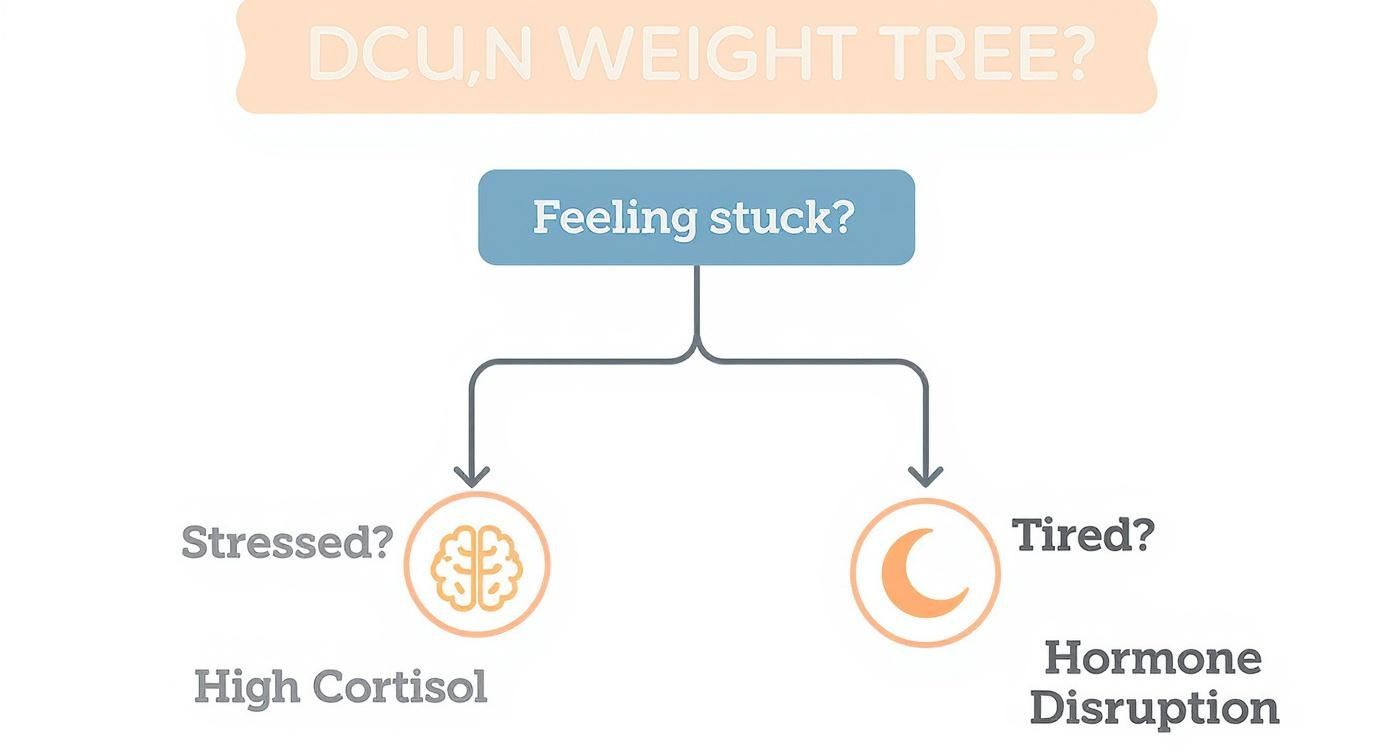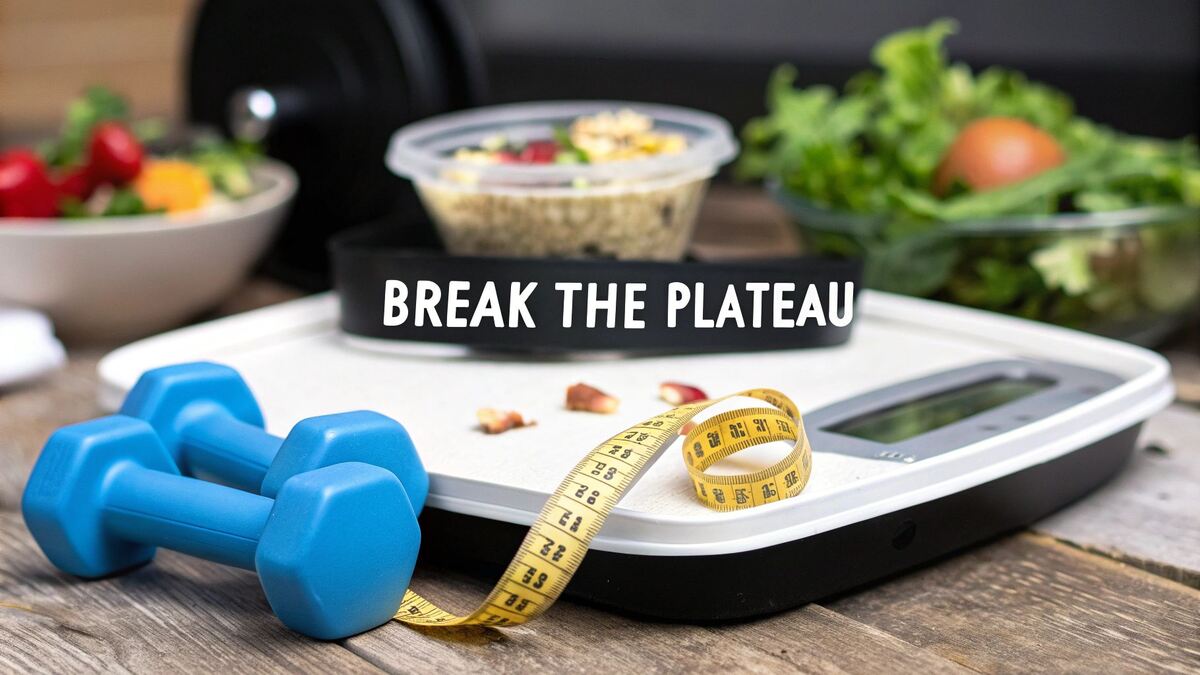How to fix why am i not losing weight: Key factors & steps
If you’ve ever found yourself asking, “Why am I not losing weight?” you’re not alone. The simple answer is that your body is a complex system. Things like your metabolism, hormones, stress levels, and sleep quality often play a much bigger role than just counting calories. Real success isn't just about the "eat less, move more" mantra; it's about understanding the hidden barriers that are holding you back.
The Weight Loss Puzzle: Why the Scale Won't Budge
It's one of the most disheartening feelings on any health journey. You're meticulously tracking your meals, you’re consistent with your workouts, but the number on the scale just refuses to go down. That feeling of being stuck is incredibly common, and it’s often the reason people give up, thinking they must be doing something wrong.
The truth is, your body isn't a simple calculator. It's a dynamic, incredibly smart system that is constantly adapting to every little change you make to your diet, exercise, and environment.

This personal struggle is part of a much bigger picture. Obesity rates have more than doubled in the last 30 years, and as of 2022, about 16% of adults worldwide are classified as obese. This isn't a failure of individual willpower; it's a sign that millions are up against the same challenges, often driven by massive shifts in our modern diets and lifestyles. You can dig deeper into these global obesity trends to see how widespread this issue really is.
Uncovering the Real Roadblocks
To figure out why the scale is stuck, we need to look beyond the obvious. So many different factors can quietly get in the way of your progress, turning what seems like a straight road into a confusing maze. These roadblocks don't work in isolation—they often team up, creating a powerful resistance to weight loss that feels impossible to overcome.
Before we dive into each one, here's a quick look at the common culprits that might be stalling your progress.
Common Hidden Barriers to Weight Loss
| Barrier | Common Misconception | Underlying Reality |
|---|---|---|
| Metabolism | "I have a slow metabolism, so I can't lose weight." | Your body can adapt by slowing its calorie burn to conserve energy. |
| Diet | "As long as I eat fewer calories, I'll lose weight." | The quality of your food impacts hormones, hunger, and energy. |
| Exercise | "More cardio equals more weight loss." | Your body gets efficient at exercise, and strength training is key. |
| Stress | "Stress is just a mental issue; it won't affect my weight." | The stress hormone cortisol can increase fat storage, especially belly fat. |
| Sleep | "I can get by on a few hours of sleep." | Lack of sleep disrupts hunger hormones, making you crave junk food. |
These are the puzzle pieces we need to put together. In the next sections, we'll break down each one, explaining what’s really going on inside your body and giving you real-world strategies to start moving forward again.
Rethinking Your Metabolism Beyond Simple Calories
If you’ve ever found yourself asking, "why am I not losing weight," your first suspect was probably calories. For decades, the message has been drilled into us: weight loss is simple math. Burn more than you eat. But while that’s part of the picture, it's a dangerously incomplete one that ignores the real star of the show—your metabolism.
Think of your metabolism as your body's personal engine. Just like some car engines are built for pure speed and guzzle fuel, while others are designed for efficiency and sip it slowly, every person's metabolic engine runs a bit differently. It’s not just about how much fuel (food) you put in the tank; it's about how your specific engine processes that fuel to create energy.

This engine is always humming in the background, even when you're just relaxing on the couch. Its overall performance is a team effort, determined by a few key components working together.
The Components of Your Metabolic Engine
The total number of calories you burn in a day, often called your total daily energy expenditure (TDEE), isn't a single, static number. It's actually a combination of several different processes.
- Basal Metabolic Rate (BMR): This is the baseline energy your body needs just to keep the lights on—powering things like breathing, blood circulation, and basic cell repair. It’s the biggest piece of the pie, typically making up 60-75% of your daily calorie burn.
- Thermic Effect of Food (TEF): Did you know it takes energy to make energy? Your body has to work to digest, absorb, and process the nutrients from your food. Protein has a much higher thermic effect than fats or carbs, meaning your body burns more calories simply by breaking it down.
- Physical Activity: This is everything else. It includes your planned workouts at the gym, but also something called Non-Exercise Activity Thermogenesis (NEAT)—all the energy you burn from everyday movements like walking to your car, fidgeting at your desk, or doing household chores.
Once you see these moving parts, it’s clear that your metabolism is far more dynamic than a simple calculator. But the real reason your progress might have hit a wall lies in how this complex engine adapts when you try to lose weight.
The Survival Instinct of Metabolic Adaptation
Here’s where the old-school "just eat less" model completely falls apart. When you consistently eat fewer calories than you burn, your body doesn't just keep chugging along at the same pace. It hits the panic button, interpreting the calorie deficit as a potential famine.
In response, it kicks off a process called metabolic adaptation, sometimes known as "adaptive thermogenesis." Your body's engine intentionally slows down to conserve energy and hold onto its precious fat stores for dear life.
This survival mechanism is a primary reason why weight loss gets harder over time. Your body isn't working against you out of spite; it's just trying to keep you alive by becoming more fuel-efficient. This efficiency makes it incredibly difficult to keep losing weight with the same old diet and exercise plan.
This slowdown is no small adjustment. Your BMR can drop, you might start feeling sluggish (which reduces your NEAT), and your body becomes a master at conserving every last calorie. This is the dreaded weight loss plateau, and it's a completely normal biological reality, not a personal failure. For those looking at specific dietary strategies, structured approaches like the AI Meal Planner's keto plans can help provide your body with satiating, nutrient-dense fuel to navigate this process. Go to https://ai-mealplan.com/plans/keto to learn more.
Working With Your Engine, Not Against It
So, how do you get around this powerful survival response? The secret is to stop fighting your metabolism and start working with it. Instead of aggressively slashing calories even further—which only makes the adaptation worse—the focus needs to shift toward strategies that support a healthy, humming metabolic rate.
Taking a comprehensive approach might even involve looking into a dedicated weight management and metabolism stack designed to support these complex bodily functions.
Ultimately, the goal is to send your body signals of safety and abundance, not deprivation and famine. This means prioritizing protein to maximize that calorie-burning TEF, incorporating strength training to build metabolically active muscle, and avoiding drastic calorie cuts that trigger your body's survival mode. By truly understanding your metabolic engine, you can finally break through the frustration of a stalled scale and create a sustainable path toward your goals.
Why the Foods You Eat Matter More Than You Think
When it comes to weight loss, it's so easy to get fixated on a single number: calories. We track every last bite, working under the assumption that as long as we stay under our daily limit, the pounds should just fall off. But if you’re still scratching your head wondering, "why am I not losing weight," the real answer might not be in how much you're eating, but what you're eating.
Think about two very different meals that both have exactly 300 calories. One is a simple grilled chicken breast with a side of steamed broccoli. The other is a sugary granola bar. On paper, they’re the same. But to your body, they couldn't be more different. The quality of your calories really dictates everything—from how hungry you feel to how your hormones respond.
This is a critical distinction. The chicken and broccoli are packed with high-quality protein and fiber, which digest slowly and keep you feeling full and satisfied for hours. The granola bar, on the other hand, gives you a quick sugar rush followed by a nasty energy crash, leaving you hungry and hunting for your next snack not long after.
The Power of Macronutrients
To really get a handle on food quality, you have to look at macronutrients—the big three building blocks of our food: protein, fats, and carbohydrates. The specific balance of these "macros" in your diet can make or break your weight loss journey.
- Protein: This is the undisputed champion of feeling full. Not only does it keep hunger at bay, but it also has a higher thermic effect of food (TEF). That’s a fancy way of saying your body actually burns more calories just digesting it.
- Fats: I’m talking about healthy fats, like the kind you find in avocados and nuts. They are absolutely essential for producing hormones and absorbing certain nutrients. They also slow down digestion, helping you feel satisfied.
- Carbohydrates: Fiber-rich carbs from sources like vegetables and whole grains give you slow, steady energy. In stark contrast, simple carbs from sugary snacks and refined grains cause blood sugar spikes that can bring fat loss to a grinding halt.
A lot of diets fail simply because they don't get this balance right. One of the most common mistakes I see is not eating nearly enough protein. This can lead to losing precious muscle instead of fat. Since muscle is your body's main calorie-burning engine, losing it slows down your metabolism, making it even harder to lose weight down the road. Our guide on how to build a high-protein meal plan is a great resource for structuring your meals to avoid this pitfall.
Uncovering Hidden Saboteurs in Your Diet
Even when you’re trying your best to make healthy choices, sneaky calories and appetite-wrecking ingredients can hide in plain sight. These are often the culprits behind a frustrating weight loss plateau.
Take that "healthy" salad you had for lunch. The greens and veggies are fantastic, but what about that creamy dressing, the candied nuts, and the crunchy croutons? Those little add-ons can easily pile on hundreds of extra calories, turning a nutritious meal into a diet disaster.
Hidden sugars and processed fats are everywhere—in sauces, condiments, so-called "health" bars, and even your morning coffee drink. These ingredients not only add empty calories but can also disrupt the hormones that control your appetite, making you feel hungrier.
The wider impact of poor diet quality is truly staggering. High body mass index (BMI) is estimated to cost global health services around US$990 billion per year, which is about 13% of all healthcare spending worldwide. This shows just how immense the challenge of treating obesity-related conditions has become. In fact, risk factors like poor diet are responsible for over half of all premature deaths from non-communicable diseases.
Switching your focus from just counting calories to prioritizing nutrient-dense, whole foods is a total game-changer. It transforms your diet from something you endure into a powerful tool that nourishes you. Digging into a detailed glucose monitoring comparison can be incredibly insightful, showing you how different foods affect your blood sugar. This kind of knowledge empowers you to make choices that truly fuel your body and set you up for sustainable, long-term success.
3. How Your Workouts Might Be Holding You Back
When the scale won't budge, the first instinct for many is to ramp up their workouts. The logic seems simple: more sweat should equal more pounds lost. But what if the very exercise routine you're counting on is actually part of the problem? The answer to "why am I not losing weight?" isn't always in the kitchen—sometimes, it's on the treadmill or in the weight room.
The common thinking is that logging endless hours of cardio is the fastest way to drop weight. While cardio is fantastic for your heart, your body is an incredibly smart and efficient machine. After a while, it adapts to repetitive workouts, figuring out how to do the same amount of work while burning fewer calories. That hour-long run that felt so tough at first eventually becomes your body's new normal, and its calorie-burning power starts to drop off.

On top of that, super-intense, long cardio sessions can sometimes backfire. They can crank up your appetite and spike cortisol, the body's main stress hormone. This hormonal cocktail can lead you to eat more later on, completely wiping out the calories you just worked so hard to burn.
Building Your Body’s Calorie-Burning Engine
So, if grinding out more cardio isn’t the solution, what is? It’s time to shift your focus from simply burning calories during a workout to building a body that burns more calories all the time. This is where resistance training becomes your secret weapon.
Lifting weights, using resistance bands, or even doing bodyweight exercises helps you build and hold onto lean muscle mass. The best way to think about muscle is as your body's metabolic furnace—the more muscle you have, the more calories you burn around the clock, even when you’re just relaxing on the sofa.
A pound of muscle burns more calories at rest than a pound of fat. By prioritizing strength training, you're not just working out for an hour; you're upgrading your body's baseline ability to burn energy 24/7.
This represents a huge change in strategy. Instead of viewing exercise as a way to "earn" a treat or "burn off" a meal, you start seeing it as an investment in a stronger, more efficient metabolism that makes managing your weight feel much less like a chore.
The Overlooked Power of Daily Movement
Your formal workouts are just one part of the equation. A massive, and often ignored, factor in how many calories you burn each day is something called Non-Exercise Activity Thermogenesis, or NEAT. It’s a fancy term for all the calories you burn from everyday movements that aren't planned exercise.
Think about all the little things that contribute to NEAT:
- Walking to your car or taking the stairs instead of the elevator.
- Fidgeting at your desk or tapping your foot.
- Doing household chores like cleaning or gardening.
- Getting up to stretch regularly during the workday.
These small movements might seem trivial, but they can add up to hundreds of extra calories burned every single day. If you have a sedentary desk job, making a conscious effort to boost your NEAT can be the key to finally breaking through a stubborn weight loss plateau.
The Danger of Overtraining and Poor Recovery
Pushing your body to the limit without giving it enough time to rest can be just as damaging as not exercising at all. Overtraining throws your system into a constant state of stress, which keeps cortisol levels high and gets in the way of your body's ability to repair muscle and burn fat.
Recovery isn't lazy; it's when all the real progress is made. Your body needs downtime to rebuild and adapt. If you ignore signs of fatigue, nagging soreness, or poor sleep, you’ll slam the brakes on your progress and end up feeling exhausted and defeated. A smart exercise plan—like one that can be fueled by a personalized menu from AI Meal Planner—always strikes a balance between work and recovery, making sure your body has everything it needs to get stronger and leaner.
4. The Invisible Forces Behind the Scenes
So far, we’ve covered the big, visible pieces of the weight loss puzzle—metabolism, food, and exercise. But what happens when you’re nailing all of those and still asking, "why am I not losing weight?" The answer often lies in the powerful, invisible forces working behind the scenes in your body: your hormones.
Think of your hormones as your body's internal messaging system. When it’s balanced, everything runs like clockwork. But when things like stress and poor sleep throw it out of whack, the messages get scrambled. One of the first things to go haywire is your body's ability to manage its weight.
The Stress Hormone That Loves to Store Fat
In our always-on world, chronic stress feels normal. Your body, however, still reacts to a looming work deadline the same way it would to a physical threat—by flooding your system with the hormone cortisol.
While helpful in short bursts, persistently high cortisol levels send a very clear signal to your body: "Danger is coming, store energy now!" This flips your metabolism into fat-storage mode, especially around your midsection. It's also the very reason you crave those high-fat, high-sugar "comfort foods" when you're stressed. Cortisol is literally telling your brain to find the quickest energy source possible.
Stress management isn't just about feeling better mentally; it's a core part of managing your weight. When you get a handle on your stress, you're directly influencing the hormones that can either help or hinder your progress.
How Skimping on Sleep Makes You Hungrier
Another unseen saboteur is poor sleep. When you don't get enough quality rest—usually 7-8 hours a night—the balance of two critical appetite-regulating hormones gets completely upended.
- Ghrelin: This is your "go" or "hunger" hormone. Lack of sleep makes ghrelin levels shoot through the roof, leaving you feeling way hungrier than you should be.
- Leptin: This is your "stop" or "fullness" hormone. When you're sleep-deprived, leptin levels plummet, meaning that feeling of being satisfied after a meal never quite arrives.
This hormonal one-two punch creates the perfect storm for weight gain. You’re starting your day with a ramped-up appetite and a broken "off switch" for hunger, which makes sticking to any healthy eating plan feel nearly impossible.
When an Underlying Medical Issue Is the Real Problem
Sometimes, you can do everything right—diet, exercise, stress management, sleep—and the scale just won't budge. In these situations, it's crucial to consider that an underlying medical condition could be the real roadblock. Certain hormonal imbalances can make losing weight feel like an uphill battle fought in the mud.
A few common conditions that have a major impact on weight include:
- Hypothyroidism: An underactive thyroid gland slows your metabolism to a crawl, making it incredibly difficult to burn calories.
- Polycystic Ovary Syndrome (PCOS): This condition often leads to insulin resistance, where the body can’t use insulin properly, resulting in increased fat storage.
Getting past these hurdles often takes more than just lifestyle changes. In fact, a recent decline in the U.S. adult obesity rate from 39.9% in 2022 to 37% in 2025 is partly attributed to the growing use of weight-loss medications like GLP-1 agonists. The use of these drugs for weight loss has more than doubled in just over a year, from 5.8% of adults in early 2024 to 12.4% in 2025. This shows that for many, medical support is a key piece of the solution, though these drugs aren't a magic bullet and require a doctor's supervision. You can learn more about this decline in obesity rates and the role of new medications.
If you suspect a hormonal issue might be at play, the most important step is to talk to your doctor. A proper diagnosis can give you the clarity you need to finally move forward. Managing what’s happening inside your body is just as important as managing what’s on your plate, and a personalized strategy from AI Meal Planner can help create a nutritional foundation that supports your body's unique needs through these challenges.
Your Action Plan to Break the Plateau for Good
Knowing why you've hit a weight loss plateau is one thing, but actually doing something about it is what gets the scale moving again. This is where we build a game plan—a way to figure out what's really holding you back and create a strategy that fits your life, not some generic template.
The trick isn't to change everything overnight. That's a surefire way to get overwhelmed. Instead, we're going to make small, smart adjustments in the key areas we’ve talked about. Lasting progress is built on habits you can actually stick with, not on extreme efforts that just lead to burnout.
Pinpoint Your Personal Roadblocks
First things first: take an honest look at your daily routine. Where are the cracks? A quick self-check can often shine a light on the real reason your progress has stalled.
- Metabolism Support: Are you getting enough protein with every meal? Making protein a priority not only helps you feel full but also keeps your metabolism fired up and protects that precious, calorie-burning muscle.
- Diet Quality: It's not just about calories. Think about where hidden sugars might be sneaking in—sauces, dressings, or even those "healthy" granola bars. Try swapping just one processed food a day for a whole-food option.
- Workout Adjustments: Has your fitness routine gotten stale? If you've been a cardio-only person, try adding two strength training sessions a week. Building muscle is one of the best ways to rev up your metabolism.
- Stress and Sleep: Be honest—how are you really doing here? Even 10 minutes of mindfulness a day or making sure you get 7-8 hours of quality sleep can make a huge difference in lowering cortisol, the hormone that tells your body to store fat.
This infographic does a great job of showing how things like stress and sleep aren't just minor details—they can have a direct impact on your results.
 As you can see, feeling wiped out or stressed out isn't just in your head; it triggers hormonal responses that can bring your weight loss to a grinding halt.
As you can see, feeling wiped out or stressed out isn't just in your head; it triggers hormonal responses that can bring your weight loss to a grinding halt.
Build a Personalized and Sustainable Strategy
Okay, so you’ve spotted a potential roadblock. Now, just pick one or two things to change. Seriously, that's it. Trying to fix everything at once is a classic mistake and a fast track to giving up.
Your action plan isn't about perfection; it's about consistent, intelligent adjustments. Focus on the one change that will make the biggest impact for you right now, master it, and then move to the next.
This step-by-step method keeps you from feeling overwhelmed and helps you build real momentum.
If you want to take the guesswork out of the food side of the equation, using a tool like our weekly meal planner can build a plan that lines up perfectly with your goals. By combining a little self-awareness with a targeted plan, you can finally push past that frustrating plateau and start seeing results again.
Your Top Questions About Weight Loss Plateaus, Answered
Even when you're doing everything right, hitting a wall in your weight loss journey can be incredibly frustrating and leave you with a lot of questions. If you're wondering, "why isn't the scale moving?" you need clear, straightforward answers to get back on track. Let's tackle some of the most common questions that pop up during this challenging—but totally normal—part of the process.
Think of this as putting the final pieces of the puzzle together. Getting past a plateau is all about listening to your body's signals and making a few smart adjustments.
How Long Does a Weight Loss Plateau Usually Last?
A weight loss plateau can hang around for a few weeks or even a couple of months. It’s simply your body’s way of adapting to your new routine. If you've been consistent with your food and fitness but the scale hasn't budged for more than four to six weeks, it might be time to shake things up.
This doesn't mean you need a complete overhaul. More often than not, a small tweak is all it takes to kickstart your progress again. You could try:
- Adjusting your calorie goal slightly.
- Switching up your workout routine, maybe by changing the intensity or type of exercise.
- Doubling down on getting enough quality sleep and managing your stress.
Could a Medical Condition Be Stalling My Weight Loss?
Absolutely. There are times when, no matter how hard you work, an underlying health issue is the real roadblock. Certain conditions like hypothyroidism (an underactive thyroid) or Polycystic Ovary Syndrome (PCOS) can mess with your metabolism and make losing weight feel like an uphill battle.
It's also worth noting that some medications, such as certain antidepressants or steroids, can cause weight gain or make it harder to lose. If you’ve tried everything and still feel stuck, it's a good idea to talk to your doctor. They can help you get a proper diagnosis and figure out the best path forward.
Is It Possible I'm Losing Fat but Gaining Muscle?
Yes, and if this is happening, it’s a great thing! This is what’s known as body recomposition, and it’s very common if you’ve recently added strength training to your routine. Muscle is much denser than fat, which means you could be losing inches and noticing your clothes fit better, even if the scale isn’t moving—or has even gone up a little.
This is a huge win and proof that you're making real progress. It's also why you should never rely solely on the scale. Use other tools to track your success, like body measurements, progress photos, and how much stronger you feel in the gym. Those will give you a much more accurate picture of your transformation.
Ready to break through your plateau with a plan that truly gets you? AI Meal Planner takes the guesswork out of the equation by building meal plans around your unique metabolism, goals, and lifestyle. Stop fighting your body and start working with it. Discover your personalized plan today!
AI-powered nutrition
Get Your Personalized Meal Plan
AI creates the perfect meals for your goals, lifestyle, and taste.
Start Your Journej
